ADHD Unplugged. Myths, Superpowers, Chaos and Strategies
ADHD (Attention-Deficit/Hyperactivity Disorder) affects how the brain regulates attention, impulse control, motivation and emotion. It’s not a character flaw, and it’s not new — clinicians were describing ADHD-like patterns as far back as 1902.
ADHD is a neurodevelopmental condition, which means it usually originates in childhood. Most people with ADHD have shown symptoms from an early age, even if those signs were subtle or went unrecognised. However, it can sometimes be diagnosed later in life, when the demands of adulthood highlight difficulties that were previously overlooked or managed unconsciously, like stress, new responsibilities, or changes in environment.
What ADHD is (in plain English)
People with ADHD can have combinations of:
• Inattention (easily distracted, forgetful, disorganised)
• Hyperactivity (restless, “on the go”)
• Impulsivity (acts/speaks before thinking)
Diagnosis is clinical (no single blood test): a specialist takes a history from multiple settings (home/work/school) and checks that symptoms cause meaningful impairment.
Some may say “Is it just an excuse for poor behaviour?”
No. ADHD is brain-based with strong genetic and neurobiological roots. That doesn’t erase personal responsibility—but it does explain why “try harder” isn’t a full solution.
Types of ADHD
1. Predominantly Inattentive Type - (formerly called ADD)
This is the quieter, more internal version — often missed or mislabelled, especially in women and adults.
How it tends to show up:
• Easily distracted or “zoning out,” especially during long or dull tasks
• Forgetting details, losing things, missing deadlines
• Trouble following through, even with good intentions
• Feels mentally foggy or “elsewhere” a lot of the time
• Often mistaken for laziness or daydreaming — but it’s really a brain struggling to filter and prioritise information
🧩 Think: The mind is open tabs everywhere, with no clear order and the Wi-Fi keeps dropping.
2. Predominantly Hyperactive-Impulsive Type
This one’s easier to spot — the energy shows up externally.
It’s not just about being “hyper”; it’s about constant mental restlessness.
How it tends to show up:
• Fidgeting, tapping, moving constantly
• Talking fast or interrupting mid-sentence without meaning to
• Acting before thinking (“impulse first, reflection later”)
• Feeling driven by an inner motor — “I can’t switch off”
• Often thrives on adrenaline and urgency, but crashes hard after
🧩 Think: The brain’s accelerator works perfectly — but the brakes are a bit faulty.
3. Combined Type
This is the most common form — a blend of inattention and hyperactivity/impulsivity.
How it tends to show up:
• Difficulty focusing unless it’s deeply interesting
• Bursts of productivity followed by burnout
• Emotional highs and lows (frustration, impatience, sensitivity)
• Racing thoughts + poor time awareness (“I thought it was 10 minutes, it was two hours”)
• A constant feeling of running behind — even when you’re doing everything you can
🧩 Think: The mind is busy, creative, overflowing — but scattered and hard to steer.
Is ADHD genetic?
Very much so. Twin and family studies put heritability at around 70–80%. There’s no single “ADHD gene”; it’s many small genetic effects interacting with environment.
You cannot "get" ADHD as an adult in the sense of suddenly developing it anew; rather, many adults discover they have it because their symptoms become more apparent or problematic.
Has it always been around?
Yes — what’s changed is recognition. Earlier generations often used labels like “hyperkinetic disorder” or “minimal brain dysfunction,” but the traits were there.
Can you “reverse” ADHD?
Not exactly. ADHD isn’t something you switch off, but symptoms can become far more manageable with age, skills and support. While ADHD is present from childhood, a diagnosis in adulthood is quite common, often helping individuals better understand themselves, often finding their thrive with access to support and strategies.
Natural ways to manage ADHD emotions
Beyond attention and impulse control, many adults with ADHD wrestle with emotional dysregulation (quick frustration, rejection sensitivity, mood swings). Learning skills can help hugely.
• Create structure and routine – Keep a predictable daily schedule, use planners or apps, and break tasks into small, clear steps.
• Try behavioural strategies or coaching – ADHD coaches, therapists or school/work programs can teach organisation, time-management and impulse-control skills.
• Exercise regularly – Aerobic movement (walking, running, swimming, dancing, team sports) boosts attention, mood and focus by regulating brain chemicals like dopamine.
• Prioritise good sleep – Aim for consistent bed/wake times, a calm bedtime routine, and limit late-night screen use.
• Eat a balanced diet – Ensure good protein, complex carbs, omega-3 fats, plenty of fruit/veg; some people also avoid excess sugar or artificial colours if they find those unhelpful.
• Practise mindfulness or meditation – Helps with focus and emotional regulation. Even short, guided sessions can be useful.
• Optimise your environment – Reduce clutter, turn off unneeded notifications, use timers or focus apps, and create “quiet zones” for work or study.
• Lean on support systems – Friends, family, mentors, or colleagues who provide encouragement and accountability can make a huge difference.
Does ADHD make you more creative or entrepreneurial?
While ADHD doesn’t automatically increase IQ, its traits can foster creativity, idea generation, adaptability and risk-taking — especially when people find passions that excites them. Hyperfocus on interests can become a superpower (but may leave dull tasks behind, making mundane tasks more challenging).
How to understand and support someone with ADHD
• Believe them when they explain what’s hard.
• Avoid labelling them as lazy; recognise how their brain works.
• Help break tasks into steps and use reminders.
• Be flexible with how they work or learn (movement breaks, visual aids).
• Celebrate their strengths: energy, creativity, fast connections, hyperfocus.
• Encourage healthy routines: sleep, movement, nourishment, downtime.
When to consider pharmaceutical intervention
Medication for ADHD should be considered when symptoms significantly interfere with daily functioning, despite attempts with behavioural strategies and lifestyle changes. This includes persistent difficulties with attention, hyperactivity, and impulsivity that impact work, education, relationships, or mental health. A thorough assessment by a healthcare professional specialising in ADHD is essential to determine if medication is appropriate. Medication may be recommended when non-pharmacological interventions alone do not provide sufficient symptom relief, and the benefits of medication outweigh potential risks. It is also important to monitor effects closely and use medication as part of a broader, holistic treatment plan that includes therapy, coaching, and self-care practices.
Final thoughts
ADHD is real, common, and very manageable. It’s not an excuse for poor behaviour; it’s a framework for understanding how someone’s mind works. With the right mix of lifestyle tools, support, and — where needed — professional help, people with ADHD can turn potential struggles into unique strengths.
Love from Fallon, with intention xox
Disclaimer
The content provided in our articles is provided for information purposes only and is not a substitute for professional advice and consultation, including professional medical advice and consultation; it is provided with the understanding that Fallon is not engaged in the provision or rendering of medical advice or services. The opinions and content included in the articles are the views only and may not be scientifically factual. You understand and agree by reading anything on our website that Fallon shall not be liable for any claim, loss, or damage arising out of the use of, or reliance upon any content or information published. You acknowledge and agree that Fallon, its authors, and contributors are not liable for any adverse reactions or consequences resulting from the use or misuse of the information provided. Always exercise caution and prioritise your health and safety. Images are from Pinterest, if you know the original creator please let us know, so that we can credit them.





